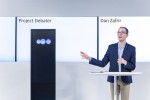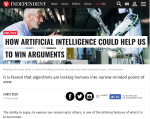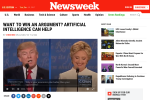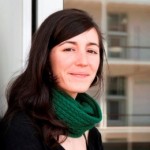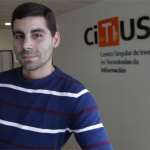
The Centre for Argument Technology is advertising two new fully-funded PhD studentships.
Harnessing Big Data to Accelerate Evaluation of Infection Outbreak
Social media and local news hold huge untapped potential as indicators of infectious disease outbreaks and resistance threats, yet the automatic processing and sense-making of vast amount of natural language unstructured data is still an enormous challenge. The project will combine two innovative and emerging AI technologies – Argument Mining (Lawrence et al. 2017) and Ethos Analytics (Duthie et al. 2016) – in which areas the Centre is working with both IBM and the BBC. By building techniques to assess the content and credibility of such data at very large scale, we will deliver an early warning system for infection outbreaks. We will partner with Health Protection Scotland to align with the MRC’s Infections Priority Challenge (MRC Delivery Plan 2016-2020).
Duthie, R., Budzynska, K & Reed, C. (2016) “Mining Ethos in Political Debate” in Baroni, P., Stede, M. & Gordon, T. (eds) Proceedings of the Sixth International Conference on Computational Models of Argument (COMMA 2016), IOS Press, Potsdam, pp299-310
Lawrence, J., Snaith, M., Konat, B., Budzynska, K. & Reed, C. (2017) “Debating Technology for Dialogical Argument: Sensemaking, Engagement and Analytics”, ACM Transactions on Internet Technology, 17 (3)
Contact Dr Kasia Budzynska or apply online. Open to applicants from the EU.
Closing date: 20 April 2018.
The Artificial Co-Investigator: AI Systems as Team Members in Discovery for Medicine
We are becoming increasingly familiar with the idea of AI as a team member in demanding cognitive environments (see this article commissioned from us by BBC News, for example). In previous work we have shown how AI reasoning systems can synthesise medical research hypotheses that go on to be testable and publishable (Quinlan et al., 2012). Our goal in this project addresses the MRC’s Discovery for Medicine agenda, and TTL in particular (MRC Delivery Plan 2016-2020), through an ambitious unification of these two threads of work, using recent results in deep learning to build AI systems that contribute to collaborative research teams in natural language (Pease et al., 2017) – and we’ll know we’ve succeeded when the AI system is listed as a co-author on published results.
The era of precision medicine is promising to deliver individualised patient treatment, but, whilst individual genetic traits can be identified, the ability to direct specific treatment is lacking. The UK is delivering some of the largest datasets worldwide that can be analysed, such as the release of data by UK Biobank. These datasets offer the opportunity for AI to find credible combinations of genetic mutations that may be candidates for drug development.
In a collaboration between the University of Dundee and the Advanced Data Analysis Centre (ADAC) at the University of Nottingham, the student will (a) develop deep learning systems for identifying regularities in genetic datasets from the UK Biobank; (b) build on existing infrastructure to develop new software for human-machine hybrid research teams; and (c) explore innovative ways of explaining and justifying research hypotheses.
Pease, A., Lawrence, J., Budzynska, K., Corneli, J. & Reed, C. (2017) “Lakatos-style collaborative mathematics through dialectical, structured and abstract argumentation”, Artificial Intelligence, 246, pp181-219.
Quinlan, P., Thompson, A. & Reed, C. (2012) “An analysis and hypothesis generation platform for heterogeneous cancer databases” in Proceedings of the 4th International Conference on Computational Models of Argument (COMMA 2012), IOS Press, Vienna.
Contact Prof Chris Reed or apply online. Open to applicants from the EU.
Closing date: 20 April 2018.
For either position, candidates should have, or be expected to achieve, a degree preferably in artificial intelligence, computational linguistics, linguistics, cognitive science, computer science or related areas. Programming experience is an advantage. The starting date of the project will be 1st Sept 2018 or as soon as possible thereafter and will run for 4 years.
Stipendary payments are at UKRI levels (£14,777 for academic year 2018/19; tax-free). Applicants should meet MRC’s eligibility requirements (see www.mrc.ukri.org).
Both positions will be held in the Centre for Argument Technology in Computing at the University of Dundee (www.arg.tech), under the supervision of Prof. Chris Reed and Dr. Katarzyna Budzynska.
At the most recent REF, computer science research in the School was rated third in Scotland, with over three quarters of its research rated world leading or internationally excellent (4* or 3*). Dundee has been ranked amongst the top places in the world for scientists to work (The Scientist), and has one of the lowest costs of living in the UK.






